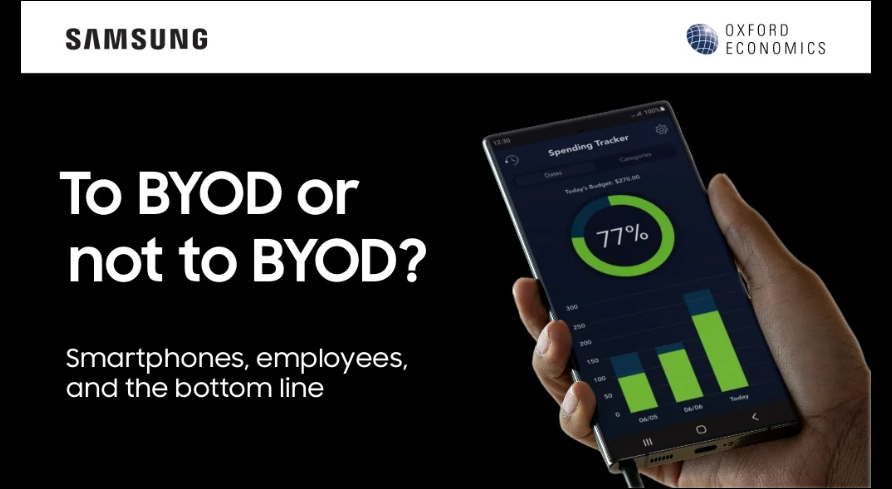Recent Release | 08 Jul 2022
Maximizing Mobile Value – To BYOD or not to BYOD?

Thought Leadership Team
Oxford Economics


Oxford Economics and Samsung collaborated to measure the contribution of smartphones in small and mid-sized businesses, and to determine whether BYOD or employer-provided devices is the right approach.
The research was fielded to 500 US executives and 1,000 employees from seven key industries: Retail, Healthcare, Transportation, High tech, Professional services, financial services and the Federal government.
Infographic

Smartphones and your employees: To BYOD or not to BYOD?
Calculator

Compare your enterprise mobility costs with the industry averages
About the team
Our Thought Leadership team produces original, evidence-based research made accessible to decision-makers and opinion leaders. Principals for this project included:

Edward Cone
Editorial Director, Thought Leadership
+1 (336) 337 3127

Edward Cone
Editorial Director, Thought Leadership
New York, United States
Editorial Director Edward Cone oversees global research programs for our Thought Leadership group. As Technology Practice Lead he works with clients such as Google, Accenture, IBM, SAP, and many others. His areas of focus include Artificial Intelligence, the impact of technology on business performance, and healthcare organizations.
Edward joined the firm in 2012 after more than two decades as a business and technology journalist based in New York, Paris, and North Carolina, including stints as an editor and writer at various Ziff Davis magazines (CIO Insight, Baseline), a contributing editor at Wired, and a staff writer at Forbes.
Edward also wrote a weekly newspaper opinion column for many years in his hometown of Greensboro, NC and authored a semi-popular blog. He has contributed to a bewildering variety of magazines and papers on topics ranging from politics to rock climbing and was a frequent speaker and organizer at new media conferences across the country. Honors for his work include the 2020 Rybczynski Prize, awarded for the best essay on economics by Society of Professional Economists, and various awards from the American Society of Business Publication Editors and the North Carolina Press Association. He has a BA from Haverford College.

Matthew Reynolds
Senior Research Manager, Thought Leadership
+1 646 503 3065

Matthew Reynolds
Senior Research Manager, Thought Leadership
New York, United States
Matt manages a broad spectrum of technology-centric Thought Leadership programs, from cloud and software innovation to how organizations can participate in the metaverse. He has led successful programs for dozens of large organizations during his tenure at Oxford Economics, including SAP, PwC, NTT Data, Accenture, IBM, and EY. Matt’s experience gives him deep knowledge of the ins and outs of successful end-to-end program management, and he is an integral part of the Thought Leadership team.
With the organization since 2015, Matt holds a Bachelor’s Degree in English from The College of New Jersey. He is scheduled to graduate with an MBA in IT and Analytics at the Rutgers School of Business in May, 2023.

Teri Robinson
Managing Editor, Thought Leadership
+1 347 254 7522

Private: Teri Robinson
Managing Editor, Thought Leadership
New York, United States
You might be interested in

Post
How Asia’s supply chains are changing | Techonomics Talks
Global supply chains have continued to expand, despite talk of deglobalization and nearshoring. US and Japan have started to de-couple from China, but other G7 countries grow more dependent on Chinese inputs. Several "hotspots" are emerging across Asia with multiple winning formulas.
Find Out More
Post
Unlocking opportunities for small and disadvantaged businesses
On behalf of Amazon, Oxford Economics has assessed the impact of a scenario in which federal agencies can claim credit for purchases made with small and disadvantaged businesses across all online marketplaces.
Find Out More
Post
TikTok: Helping grow small and midsized businesses and deliver value for consumers across the United States
Starting in late May 2023, Oxford Economics, in collaboration with TikTok, initiated a study to better measure the economic value of the TikTok platform to local communities across the US. As part of the research, we surveyed 1,050 SMBs that use TikTok, and 7,500 TikTok users to learn how businesses and users interact with the app and leverage the economic and social opportunities it provides.
Find Out More
Post
Ride-Hailing: A Platform for Women’s Economic Opportunity in Bangladesh
In collaboration with Uber, our latest report: “Ride-Hailing: A Platform for Women’s Economic Opportunity in Bangladesh” explores the transport challenges limiting women’s economic participation in Dhaka and the role that ride-hailing can play in overcoming them.
Find Out More